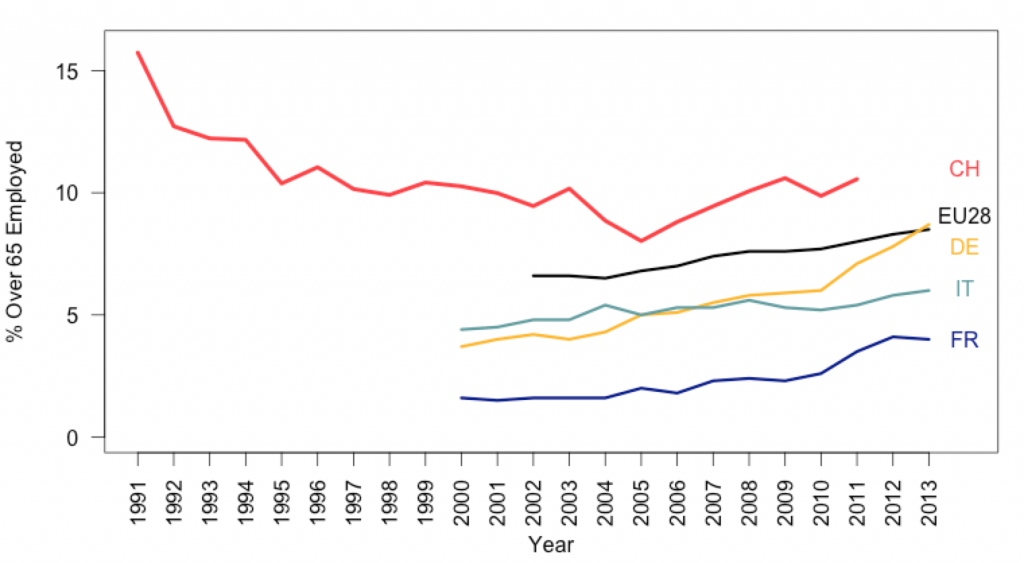
David Kellen has left us (CDS) to start a new position as Assistant Professor at Syracuse University, NY, US.
Congratulations on the new job! We wish you all the best and hope you’ll visit us again soon – até breve!

David Kellen has left us (CDS) to start a new position as Assistant Professor at Syracuse University, NY, US.
Congratulations on the new job! We wish you all the best and hope you’ll visit us again soon – até breve!

OvidToday, an easy-to-use app for your library’s Ovid-subscribed journals, is aimed at providing you with the latest and most-relevant content. This app – available for iPad® and Android™ devices – offers instant access to browse through your institution’s Ovid journals – including multiple issues and Publish Ahead of Print. Plus, users can read or save PDF articles.
How can you access the Ovid Today App?
Step 1: Download the free iPad app from the App store
Download the free Android app from Google Play
Step 2: Start your Cisco AnyConnect Client
Step 3: Click on “Let’s Get Started” and create a personal account
See details here
The current Uni Nova features Judith Tonner’s course on sustainability, which trains students in using social and clincial psychological knowledge to foster sustainable behavior.
The course will be offered again in Spring 2016 for Bachelor students in Psychology and MSD students. For further information, see:
Seminar: Psychologie im Dienste der Nachhaltigkeit
The “Fachgruppe Psychologie” organizes two movie nights this semester and welcomes all interested. One of the movies will be introduced from a social psychological perspective. Please register in advance, see flyer.
The University of Basel will be commemorating its 555 years with a science night – Uni-Nacht 2015: Lange Nacht der Wissenschaft – on Friday, Sept. 18th, 2015. Most events take place at the main university building (Kollegienhaus) but there are interesting talks, tours, and other activities taking place in other campus locations as well. Below are a few events organised by members of the Social, Economic, and Decision Psychology Area but you can find the full program online here.
Kollegienhaus Hörsaal 120
19:00 • Wie gut können die Leute ihr Glück vorhersagen?
Rainer Greifeneder and Alois Stuzer will be talking about predicting happiness from a psychologist’s and an economist’s perspective, respectively. Their talks will be followed by a discussion between the two.
SWE members have also organised some experiments that Uni-Nacht attendees can take part in as a way to learn about social psychology and risk taking research…
Kollegienhaus, Computerrraum UG 112
18:00 to 24:00 • Sozialpsychologie zum Mitmachen
Kollegienhaus, vor Hörsaal 117
18:00 to 24:00 • R!s!ko – Risikobereitschaft schätzen und testen
At CDS, we study the life span development of performance in different domains, particularly decision making, and are interested in the interplay between, on the one hand, the gains in knowledge from a life time of experience, and, on the other, the age-related losses in physical and cognitive abilities due to biological aging. An ecological perspective on aging suggests that the result of such gain/loss interactions on performance is a function of task demands.
I’ve been trying to find examples of such task-dependent age-performance patterns and last weekend’s Champions League final gave me an incentive to look into the age distribution of soccer players and managers. Gianluigi Buffon, Juventus’ goalkeeper, at 37, was the oldest player on the pitch… Could such longevity be found in other positions?
I got the player data from the 2014/2015 edition of the tournament at UEFA.com and plotted the age distributions of players as a function of position and whether they actually played in the tournament (as opposed to just being on the roster). I also searched Wikipedia for the managers’ ages.
Here’s the 3 main points I take from this figure:
1) The results suggest that Buffon’s longevity can be matched in other positions but the age distributions do vary systematically, with Forwards being the youngest and Goalkeepers the oldest group on average. This makes sense because past research suggests that Forwards typically perform many more high intensity activity plays relative to, say, Goalkeepers. This is an example of different tasks (i.e., soccer positions) posing different challenges to aging individuals.
2) The age differences between the players that do and do not play (0 vs. > 0 Appearances) seem to suggest that aging is not only associated with losses but also gains – most likely experience.
3) The fact that players are much younger than managers suggests that there is a limit to experience offsetting physical decline. Notwithstanding, experience as a player can prove useful later on: Thirty out of 32 managers in the 2014/2015 Champions League edition are ex-professional soccer players!
One would also like to link age to actual performance. This is not always trivial because objective measures of performance are often not available. However, for Forwards in the Champions League one can look at goals scored, which I’ve plotted below as a function of age (circle diameters are proportional to the number of players in that age bracket). The results show a peak/plateau starting before 30s as would be expected from the age distribution of Forwards in the previous figure…
Ideally, one would have a full description of task demands and age-related changes in physical prowess, cognitive abilities, and knowledge, in order to make predictions about the shape of age-performance relations in other domains, such as professional occupations, something I hope to do in the near future…
I’ve recently come across an article in Die Welt about a sizeable increase in the number of German workers over 65 years of age. The piece refers to a report by Ina Esselmann and Wido Geisthe from the Cologne Institute for Economic Research on the topic. Of course, this finding could either be seen as good or bad news for aging workers, depending on the reasons for the increase. One of the conclusions of the report, however, is that financial insecurity in old age is not the main reason behind this increase. In fact, it seems that those already better off are the ones working longer: “Factors with a significant influence on the probability of those between the ages of 65 and 74 remaining active in the workforce include a high level of educational qualifications, a highly skilled expert or management position and especially self-employment. (…) Today, gainful employment among the elderly is thus less a result of a low pension than of good job and earning prospects.”
This type of results suggests to me that (at least some) older workers are successfully mastering their work environments, which may indicate that aging is not necessarily associated with decreases in work performance… (I’m hopefully writing a paper about this soon!)
I was also interested in seeing whether the trend observed in a number of EU countries can also be seen in Switzerland. Esselmann and Geisthe provide their data online (thank you!) and the Bundesamt für Statistik supplies what seem equivalent estimates for Switzerland (I’m a big BfS fan!). The figure below seems to suggest a similar trend for the last few years in Switzerland, but, more impressively, a rather high rate of individuals over 65 in the Swiss workforce relative to other countries. It would be interesting to find out the motives keeping these individuals at work…

The German Psychological Association (DGPs) has recently reported a study investigating job chances for Psychology graduates by looking at positions offered in online portals (e.g., Zeit online). The results suggest that a significant portion of jobs offered are in the area of Organizational Psychology, which should be good news for our Social, Economic, and Decision Psychology graduates. Importantly, another conclusion from this study is that students should be informed early on about applications of Psychology outside of clinical practice.
Here is the conclusion in German:
“Auch wenn der relative Anteil der Stellenangebote in den verschiedenen Berufsfeldern durch diese Erhebung nicht repräsentativ dargestellt werden kann, so bietet die Recherche einen guten Einblick bezüglich der Anforderungen an Absolventinnen und Absolventen, da eine große Bandbreite von Arbeitgebern – von der Privatpraxis bis zum DAX-Konzern – die in der Recherche berücksichtigten Stellenbörsen nutzen. (…). Die Recherche zeigt darüber hinaus, dass es auch außerhalb der klinischen Psychologie zahlreiche Stellenangebote für Psychologinnen und Psychologen gibt. Studierende sollten zu Beginn ihres Studiums deutlicher als bisher auf die beruflichen Chancen außerhalb der klinischen Psychologie hingewiesen werden.”
One interesting issue in life span development is how age-related changes in different core abilities, like attention, memory, and so on, impact achievement in the real world, such as everyday financial and health decisions. Many areas of performance show an inverted-U shape across the life span, with improvements being typically seen during adolescence and young adulthood, and decline being more often than not observed in older age. I just read that Forbes has a new list of billionaires and that got me thinking whether such a pattern exists for such things as wealth?
I took the data from Forbes (N = 1762 for which age and net worth was available) and, as can be seen below, the mean age of billionaires is around 60. There could be a number of reasons for this but one likely factor is that it takes time to accumulate wealth (Forbes writes that the majority of millionaires, ca. 1200, are self-made billionaires with the rest having inherited their fortunes).
But does wealth show an inverted-U like shape across the life span? The Forbes data suggest it does not. It looks like there is a positive correlation between age and net worth, suggesting that old age does not lead losses in accumulated capital… In this way, capital seems to work a bit like the accumulation of knowledge which tends to show a gradual increase across the life span.
I conducted a survey concerning students’ interests in Cognitive Psychology. I sent an email to 150 1st-year students registered in the lecture Kognitionspychologie II and received 95 responses. The results are presented below as beanplots, which depict the distribution across the 1-7 point scale going from “not at all interesting” to “extremely interesting”. The good news: Most of the students find that the main topics covered in the lecture are interesting. Not so good news: Students find math and methods relatively uninteresting. Of course, that will change dramatically once they attended the lecture… 🙂